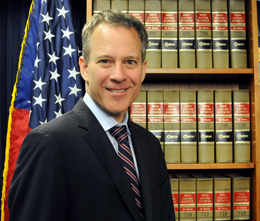 In Letter To House Science Committee Chairman Smith, NYOAG Makes Clear: Subpoena Oversteps Boundaries Of Federalism, Separation Of Powers, Committee Jurisdiction – And Seeks To Distract, Delay, And Disrupt Multiple State And Federal Investigations Into Whether Exxon Committed Fraud
In Letter To House Science Committee Chairman Smith, NYOAG Makes Clear: Subpoena Oversteps Boundaries Of Federalism, Separation Of Powers, Committee Jurisdiction – And Seeks To Distract, Delay, And Disrupt Multiple State And Federal Investigations Into Whether Exxon Committed Fraud
Today, New York Attorney General Eric T. Schneiderman responded to a subpoena issued by the Chair of the House Committee on Science, Space, and Technology, Republican Texas Congressman Lamar Smith. In the letter to Smith, the New York Office of the Attorney General makes clear that the subpoena oversteps the boundaries of federalism, separation of powers, and the Committee’s own jurisdiction – seeking to distract from, delay, and disrupt multiple state and federal investigations into whether ExxonMobil committed fraud.
Read the Attorney General’s full response here.
The letter states, “We had hoped that with the start of a new Congress, the Committee on Science, Space, and Technology would turn its attention exclusively to authorized and legitimate legislative activity. Your Subpoena does otherwise. I write to inform you that the NYOAG cannot and will not comply with the Subpoena as presently composed.”
The subpoena’s intent to disrupt NYOAG’s Exxon investigation is clear. It not only seeks material from the Attorney General’s open state investigation into whether Exxon violated New York securities laws, but also reflects an even broader scope than Smith’s prior subpoena — seeking communications not just related to the Exxon investigation but “referring or relating to climate change, environmental scientific research, and/or the Clean Power Plan.”
As NYOAG’s letter states, “An inquiry into the alleged effects of the NYOAG’s state law fraud investigation on the research of climate scientists does not require a trove of confidential communications about ongoing law enforcement matters.”
The NYOAG letter points to the subpoena’s effort to obtain privileged communications among the offices of state attorneys general regarding the Clean Power Plan litigation, as Chairman Smith has filed a brief in the litigation seeking to strike down the plan. That Smith, “a de facto adversary in high-stakes litigation, [is] wielding unilateral subpoena power to demand all privileged communications between the NYOAG and other State Attorneys General about the Clean Power Plan is an unfathomable offense,” the letter states.
In November 2015, Attorney General Schneiderman launched an investigation into whether Exxon violated State laws against securities, business, and consumer fraud through potentially false or misleading public statements and disclosures about the impact of climate change on its operations and finances. The Exxon investigation followed a settlement with Peabody Coal, which found that Peabody had violated New York’s securities laws by making false and misleading statements about the impact of climate change on the company.
A New York court repeatedly has ordered Exxon to produce documents to the NYOAG, and Exxon itself has acknowledged in open court that the Attorney General has “the right to conduct” its fraud investigation under New York law. The company has produced millions of pages of documents in response to the NYOAG’s subpoena.
Yet Chairman Smith continues to “ignore the concededly legitimate fraud investigations by sovereign states currently under the supervision of state courts” and – following his original subpoena issued in July 2016 – issued a new subpoena in February 2017. Chairman Smith has offered various and shifting explanations for his unprecedented subpoenas, including claiming that investigations by the New York and Massachusetts Attorneys General into whether Exxon violated their state laws somehow undermines climate scientists’ First Amendment rights.
The NYOAG letter points to the Congressional Research Services’ finding that no congressional committee has ever subpoenaed a state attorney general, and there is certainly no precedent for a congressional subpoena seeking material from a confidential law enforcement investigation. The letter concludes, “There can be no ‘legitimate congressional oversight’ of a state law fraud investigation. The Committee chose to pursue (and now to continue) this course, despite the lack of any precedent for such action in our Nation’s recorded history, and despite the obvious constitutional problems your subpoenas have raised, as explained to you by the NYOAG, the Massachusetts Attorney General, several members of your own Committee, other sitting Senators and Representatives, the former Acting General Counsel of the House of Representatives, and a bevy of federalism and First Amendment scholars.”
NYOAG’s response to the subpoena follows a letter sent yesterday by 15 Attorneys General to Smith, making clear that the unprecedented subpoenas both exceed the Committee’s constitutional authority and depart from proper respect for state functions.

